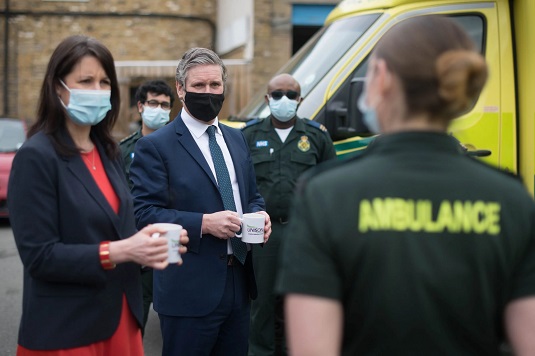Was North Shropshire a Labour Disaster?

Is the straightforward reason that Keir Starmer isn't any good, and disgruntled Tories find his affectations unappealing? Perhaps, but on this occasion I'm not convinced this is the case. It seems obvious the leadership did not fancy Labour's chances from the start. Money was held back, Dear Keir didn't condescend to visit North Shropshire, and apart from a handful of shadow ministers dropping in there was little sense of urgency or enthusiasm for the campaign. If one was of a conspiratorial turn of mind, it might be suggested stitching up the selection and causing unnecessary local bad press was an evil genius move to concede the field to the LibDems.
But as the party was second placed last time, why throw in the towel? One of the arguments doing the rounds is the LibDems came second in this year's county elections so they're the natural repository of the anti-Tory vote. That's certainly the case for Shropshire as a whole, but the picture in North Shropshire is mixed. They were not uniformly runners up in this part of the world, but of the opposition parties they were the ones who made more of an effort to stand. Whitchurch, Wem, and The Meres were wards typical of the constituency as a whole: pretty much a Labour-free zone as far as candidates were concerned. Though, as recent general election votes showed the Labour votes are there. If the Great Satan Jeremy Corbyn could find them, that might suggest a good basis for a by-election insurrection? It would normally, and so we're left with something of a mystery. Unless a behind-the-scenes secret handshake had taken place between the two parties - the LibDems scaled back campaigning efforts in Old Bexley and Sidcup so they could have a clearer run where, according to Starmer's and Ed Davey's "feels", the LibDems stood more of a chance of winning.
Whatever the case, the message got out that a LibDem vote was the best way to punish the Tories and the good people of North Shropshire responded with alacrity. Therefore, given tactical voting was in play this was not the disaster the voting numbers suggest. But it still raises two issues Labour needs to address. First, as suggested in my Tribune piece, it is concerning Labour has so far not benefited from tactical voting anywhere near to the same extent. The tiny LibDem vote dipped in Old Bexley, and it seemed absent from the Hartlepool debacle. As Labour had an equal claim to North Shropshire beyond the "feels" of the hacks and Westminster wiseacres, when will it emerge victorious off the back of protest voting?
The other problem might seem minor but could store up trouble for Labour in the future: the Greens. As argued previously, the Greens are, sociologically speaking, an alliance of the petit bourgeoisie and the emerging new working class of immaterial/socialised workers. This is a problem because the latter are the core constituency of the Labour Party these days, a process of composition Corbynism accelerated and Starmer and friends are seemingly oblivious to. As such, the repeated feints to the right on public spending and immigration, for example, won't curry favour with this constituency and some of them can get peeled off by the Greens. At a local level, this is seen in the Greens' slow but steady growth in local government, but with the possibility of taking more support in the future. This could make the difference in the swing seats Starmer needs to win back. But interestingly, in North Shropshire - just like Old Bexley - the Green vote stayed stubbornly still. While not a lot to shout about to begin with, the fact these voters stayed put when tactical voting was understood by the electorate is, at least, interesting and worth keeping an eye on.
Not quite the disaster it seems at first glance, but not really good news for Labour beyond their being one less government vote in the chamber.